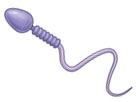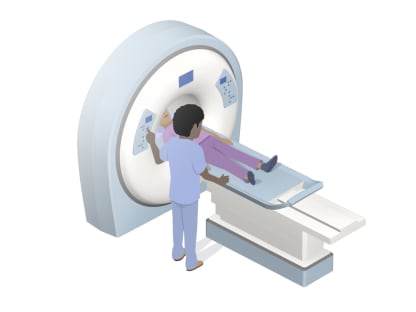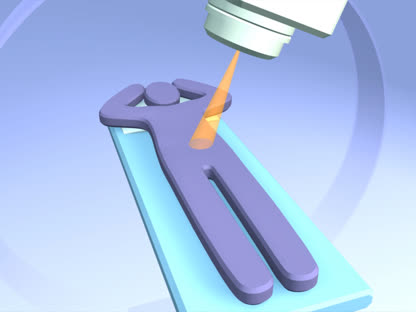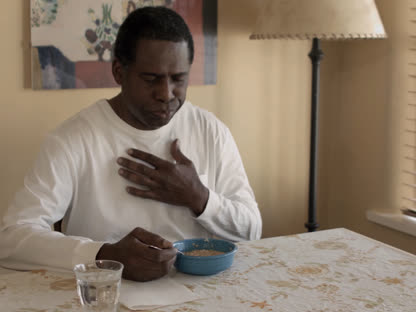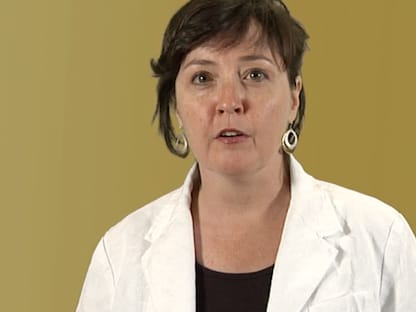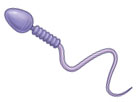Testicular Cancer
Condition Basics
What is testicular cancer?
Testicular cancer occurs when cancer cells grow in the tissues of one or both testicles (testes). It is one of the most curable types of cancer.
The testes are the two male sex organs that make and store sperm, Opens dialog. They are located in a pouch below the penis called the scrotum. The testes also make the hormone testosterone.
Testicular cancer is rare. But it is the most common cancer among young people with testicles.
Most testicular cancers start in cells that make sperm. These cells are called germ cells. The two main types of testicular germ cell cancers are seminomas and nonseminomas. Seminomas grow and spread slowly and respond to radiation therapy. Nonseminomas grow and spread more quickly than seminomas. There are several different types of nonseminomas.
What are the symptoms?
One of the most common symptoms of testicular cancer is a lump or swelling in the scrotum that may or may not be painful. Also common are a heavy feeling in the scrotum and a dull pain or feeling of pressure in the lower belly.
How is it diagnosed?
If testicular cancer is suspected, your doctor will do tests. An ultrasound may be used to rule out other possible causes of a testicle problem. Blood or imaging tests may also be done. If these tests show signs of cancer, you will have surgery to remove the testicle. It will be checked for cancer.
How is testicular cancer treated?
Treatment for testicular cancer is based on the type and stage, Opens dialog of the cancer and other things, such as your overall health. The main treatment is surgery to remove the testicle. This may be the only treatment you need. Sometimes there is treatment after surgery, such as chemotherapy, Opens dialog or radiation therapy, Opens dialog.
Related Videos
Health Tools help you make wise health decisions or take action to improve your health.
Some things may increase your chances of getting testicular cancer. These risk factors include:
- An undescended testicle, Opens dialog. This is a testicle that has not moved down (descended) from the abdomen into the scrotum.
- Klinefelter syndrome, Opens dialog. This is a genetic condition.
- A personal or family history, Opens dialog of testicular cancer.
Most people who get testicular cancer don't have any known risk factors.
What are the symptoms of testicular cancer?
Common symptoms of testicular cancer include:
- A swelling and/or lump in one or both of the testes. You may or may not have pain in the testes or scrotum.
- A heavy feeling in the scrotum.
- A dull pain or feeling of pressure in the lower belly or groin.
Sometimes these symptoms can be caused by other problems, such as a hydrocele, Opens dialog or epididymitis, Opens dialog.
Symptoms of advanced testicular cancer
Testicular cancer that has spread (metastasized) beyond the testicles and regional lymph nodes, Opens dialog to other organs may cause other symptoms depending on the area of the body affected. Symptoms of late-stage testicular cancer may include:
- Dull pain in the lower back and belly.
- Lack of energy, sweating for no clear reason, fever, or a general feeling of illness.
- Shortness of breath, coughing, or chest pain.
- Headache or confusion.
In most cases, the first sign of testicular cancer is a change in the size or shape of one or both testicles (testes). Often this change doesn't cause pain, though pain may be present. If unnoticed or untreated, testicular cancer may spread (metastasize) to other areas of the body.
After you are diagnosed with testicular cancer, you and your doctor will start to plan your treatment. Nearly everyone who has testicular cancer has surgery. After surgery, you may have other treatments, if they are needed. This depends on your choices, the type of cells involved, and the stage of your cancer.
Testicular cancer is one of the most curable forms of cancer, especially during its early stages. If you have symptoms, see a doctor as soon as possible.
Call your doctor as soon as possible if you have any symptoms of testicular cancer, including:
- A swelling or lump in one or both of the testes. You may or may not have pain in the testicles or scrotum.
- A heavy feeling in the scrotum.
- A dull pain or feeling of pressure in the lower belly or groin.
Surveillance
Some early-stage testicular cancers are successfully managed with a "wait-and-see" approach after surgery. This option involves frequent exams as well as blood tests and imaging tests to watch your condition. Surveillance, Opens dialog may let you avoid the side effects from other follow-up treatments, such as chemotherapy and radiation therapy.
If testicular cancer is suspected, your doctor will do some testing. Tests can include a testicular ultrasound, which may be used to rule out other possible causes of an enlarged or painful testicle. Blood tests may be done to measure the levels of certain tumor markers in your blood. Or you may have a chest X-ray or CT scan of the chest, abdomen, and pelvis.
If these tests suggest cancer, you will have surgery to remove the testicle. It will be checked for cancer. If cancer is found, you may have other tests to find out the stage of your cancer.
Screening tests for testicular cancer
Testicular cancer is not common. It is often first discovered by the person or a sex partner as a lump or an enlarged and swollen testicle. In the early stages of testicular cancer, the lump, which may be about the size of a pea, usually is not painful. Testicular cancer has a high cure rate.
Experts don't recommend screening for testicular cancer. For example, the U.S. Preventive Services Task Force, Opens dialog advises against routine testicular exam or testicular self-exams in teens and adults who have no symptoms.footnote 1 The USPSTF says that the evidence shows that these exams have only a small benefit (if any) and may cause harm from false-positive results, Opens dialog that lead to having diagnostic tests or procedures you don't need.
Monthly testicular self-exams, Opens dialog may be recommended for those who are at high risk for testicular cancer. This includes anyone who has a history of an undescended testicle or a family or personal history of testicular cancer.
Learn more
Watch
Treatment for testicular cancer is based on the type and stage, Opens dialog of the cancer and other things, such as your overall health. The main treatment is:
- Surgery.
- Surgery to remove the testicle may be the only treatment you need. In some cases, surgery may also be done to remove lymph nodes in the belly.
After surgery, you may need only active surveillance, Opens dialog. Or you may have more treatment, such as:
- Chemotherapy.
- These medicines kill fast-growing cells, including cancer cells and some normal cells.
- Radiation therapy.
- This uses high-dose X-rays to destroy cancer cells and shrink tumors.
For advanced cancer, treatment may include a stem cell transplant, Opens dialog or a clinical trial, Opens dialog.
Before you have surgery or any treatment for testicular cancer, talk to your doctor about sperm banking. Some cancer treatments can cause infertility.
Your doctor will talk with you about your options and then make a treatment plan.
Learn more
Watch
Palliative care is a type of care for people who have a serious illness. It's different from care to cure your illness, called curative treatment. Palliative care provides an extra layer of support that can improve your quality of life—not just in your body, but also in your mind and spirit. Sometimes palliative care is combined with curative treatment.
The kind of care you get depends on what you need. Your goals guide your care. You can get both palliative care and care to treat your illness. You don't have to choose one or the other.
Palliative care can help you manage symptoms, pain, or side effects from treatment. It may help you and those close to you better understand your illness, talk more openly about your feelings, or decide what treatment you want or don't want. It can also help you communicate better with your doctors, nurses, family, and friends.
Learn more
- Take your medicines exactly as prescribed. Call your doctor if you think you are having a problem with your medicine.
- Eat healthy food. If you do not feel like eating, try to eat food that has protein and extra calories to keep up your strength and prevent weight loss. Drink liquid meal replacements for extra calories and protein. Try to eat your main meal early.
- Get some physical activity every day, but do not get too tired.
- Get enough sleep and take time to do things you enjoy. This can help reduce stress.
- Think about joining a support group. Or discuss your concerns with your doctor, counselor, or other health professional.
- If you are vomiting or have diarrhea:
- Drink plenty of fluids to prevent dehydration. Choose water and other clear liquids. If you have kidney, heart, or liver disease and have to limit fluids, talk with your doctor before you increase the amount of fluids you drink.
- When you are able to eat, try clear soups, mild foods, and liquids until all symptoms are gone for 12 to 48 hours. Other good choices include dry toast, crackers, cooked cereal, and gelatin dessert, such as Jell-O.
- Take care of your urinary tract to prevent problems such as infection. Limit drinks with caffeine, drink plenty of fluids, and urinate every 3 to 4 hours.
- If you have not already done so, prepare a list of advance directives. Advance directives are instructions to your doctor and family members about what kind of care you want if you become unable to speak or express yourself.
Learn more
- Cancer: Controlling Cancer Pain
- Cancer: Controlling Nausea and Vomiting From Chemotherapy
- Cancer: Home Treatment for Constipation
- Cancer: Home Treatment for Diarrhea
- Cancer: Home Treatment for Fatigue
- Cancer: Home Treatment for Mouth Sores
- Cancer: Home Treatment for Pain
- Cancer: Home Treatment for Sleep Problems
- Cancer Support: Managing Stress
- Eating Well During Cancer Treatment
- Hair Loss From Cancer Treatment
- Quitting Smoking
Watch
Testicular cancer may be treated with:
- Surgery to remove a testicle (radical inguinal orchiectomy). Nearly everyone with testicular cancer has this surgery.
- Surgery to remove lymph nodes in the pelvis and lower back (retroperitoneal lymph node dissection, or RPLND). This may be used for nonseminoma cancer.
- Surgery to remove other areas of cancer if it has spread in the body. This is done for nonseminoma cancer, either before or after having chemotherapy.
In most cases, removing a testicle doesn't cause long-term sexual problems or make you unable to have biological children. But if you had these problems before treatment, surgery may make them worse. And other treatments for cancer may cause you to become infertile. You may want to think about saving sperm in a sperm bank. Talk to your doctor if you have any questions or concerns about sexual problems or whether you can have biological children.
You can choose to get an artificial, or prosthetic, testicle. A surgeon places the artificial testicle in the scrotum to keep the natural look of the genitals.
Learn more
Some people use complementary therapies along with medical treatment. They may help relieve the symptoms and stress of cancer or the side effects of cancer treatment. Therapies that may be helpful include:
- Acupuncture to relieve pain and other symptoms.
- Meditation or yoga to relieve stress.
- Massage and biofeedback to reduce pain and tension.
- Breathing exercises to help you relax.
Talk with your doctor about any of these options you would like to try. And let your doctor know if you are already using any complementary therapies. They are not meant to take the place of standard medical treatment. But they may help you feel better and cope better with treatment.
Learn more
Watch
Relationships take on new importance when you're faced with cancer. Your family and friends can help support you. You may also want to look beyond those who are close to you.
- Reach out to your family and friends.
Remember that the people around you want to support you, and asking for help isn't a sign of weakness.
- Tell them how they can help.
Your friends and family want to help, but some of them may not know what to do. It may help to make a list. For example, you might ask them to:
- Run errands or pick up kids.
- Deliver meals or groceries to your home.
- Drive you to appointments.
- Go to doctor visits with you and take notes.
- Look for help from other sources.
Places to turn for support include:
- Counseling.
- Counseling can help you cope with cancer and the effect cancer is having on your life. Different types of counseling include family therapy, couples therapy, group counseling, and individual counseling.
- Your health care team.
- Your team should be supportive. Be open and honest about your fears and concerns. Your doctor can help you get the right medical treatments, including counseling.
- Spiritual or religious groups.
- These groups can provide comfort and may be able to help you find counseling or other social support services.
- Social groups.
- Social groups can help you meet new people and get involved in activities you enjoy. Focus on activities that bring you comfort, such as spending time outdoors or being with children.
- A cancer support group.
- Cancer support groups offer support and practical advice. You can hear others talk about:
- What it's like to live with cancer.
- Practical ways to manage your cancer treatment and its side effects.
- Ways to cope with your illness.
Learn more
Watch
Current as of: October 25, 2024
Author: Ignite Healthwise, LLC Staff
Clinical Review Board
All Healthwise education is reviewed by a team that includes physicians, nurses, advanced practitioners, registered dieticians, and other healthcare professionals.
Current as of: October 25, 2024
Author: Ignite Healthwise, LLC Staff
Clinical Review Board
All Healthwise education is reviewed by a team that includes physicians, nurses, advanced practitioners, registered dieticians, and other healthcare professionals.
Topic Contents
This information does not replace the advice of a doctor. Ignite Healthwise, LLC, disclaims any warranty or liability for your use of this information. Your use of this information means that you agree to the Terms of Use. Learn how we develop our content.


